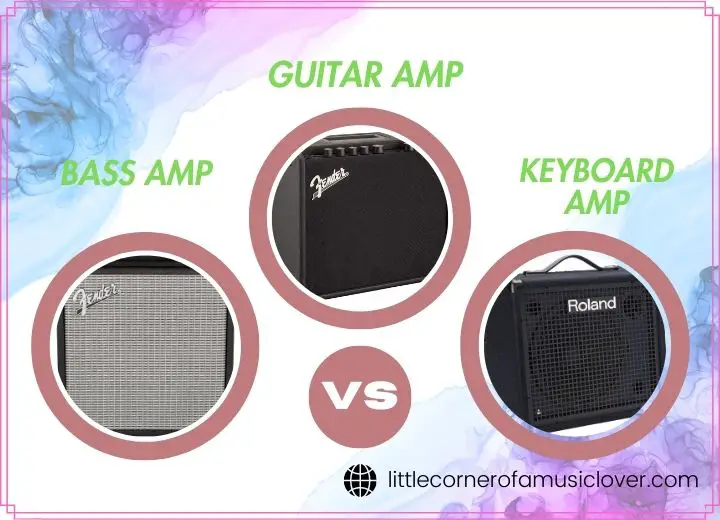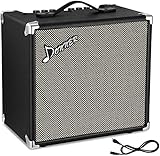Can you distinguish bass amp vs. keyboard amp vs. guitar amp? Don’t worry if you are confused. Our detailed comparison helps you clear it. Let’s check!
#1. Bass Amp vs. Keyboard Amp Vs. Guitar Amp
Amplifiers work differently depending on the type you use. Here are the differences between bass amp vs. keyboard amp vs. guitar amp, based on multiple factors.
|
Bass Amp |
Keyboard Amp |
Guitar Amp |
|
| Definition |
|
|
|
| Features |
|
|
|
| Frequency Range |
|
|
|
| Speakers |
|
|
|
| Tone |
|
|
|
| Power need |
|
|
|
| Pros |
|
|
|
| Cons |
|
|
|
| Best For |
|
|
|
#2. What Is The Difference Between Bass Amp vs. Keyboard Amp Vs. Guitar Amp?
After checking the table above, you can tell how each instrument differs from the others. This section will focus on the three most important factors in evaluating an amp: frequency range, speakers, and power requirement.
Frequency range
The guitar sound has more high-frequency signals than low frequencies. Hence, a typical guitar amplifier may respond to ranges from 300 Hz to 11kHz.
Meanwhile, keyboard amps can deal well with human-audible frequencies.
The keyboard utilizes seven octaves and overtones depending on the sounds it is generating. So, it can produce different sounds and respond to higher ranges.
Bass amps work with lower frequencies. However, because the signal/sound it creates has low-frequency waves, it requires more power to send the sound through the speakers.
Speakers
The bass amp has the biggest speakers, which are often 15 inches. You can also buy 10-inch models. Some cabs have only one speaker, while others come with eight to ten.
The second biggest of the three amps is the keyboard. It’s larger than the guitar amp because it needs big speakers to deliver the sound and make it loud enough to hear.
Please note that a keyboard amp may have difficulty reproducing low-frequency pitches. Hence, they need large speakers to make it possible, especially for live performances.
How about the guitar amp? This instrument works with high-frequency pitches and performs a good job with its small speakers.
Power requirement
A keyboard amplifier needs the power to transmit low-voltage signals into ones that can run the speakers. As discussed earlier, it’s how the amp can deal with low frequency.
A bass amplifier also requires much power wattage. Although it sometimes works like a guitar amp, most bass amp makers have turned them into a solid-state system.
After the change, a bass amp has more headroom for its sound signal. Such tasks are easier to operate at high wattages.
If you look for an instrument with a low power requirement, it must be the guitar amp. It already has mid- to high-range signal conversion, making the sound audible.
#3. Bass Amp vs. Keyboard Amp Vs. Guitar Amp: Which One Should You Go For?
The three instruments are built to serve different purposes. You can use them interchangeably, but keeping them at their primary functions would be best.
So, when to choose what? We have some suggestions for you right here:
When to choose a bass amplifier?
This amp works best when you need to add bass to your tracks. The newly-created sound also has more depth.
Another situation to use this instrument is when you want to raise the volume of low-pitched sounds. Its big speakers are a big help for your live performances.
When to choose a keyboard amplifier?
This instrument is flexible and can assist you in producing multiple tones. You will love its clean and flat sound.
Their speakers are also big enough to make your sound easily audible. Yet, the volume doesn’t sacrifice the transparent tone.
When to choose a guitar amplifier?
This model will be your best choice if price and power saving are your top concerns. You can also bring your instrument anywhere thanks to its small-sized speakers.
If you are a guitarist, you won’t want to miss this option. It does an excellent job of reproducing bass and guitar sound for your tracks. You will also want to use it for your acoustic tunes.
#4. Frequently Asked Questions
Is there a difference between a guitar amp and a keyboard amp?
Yes. The guitar amp is smaller, cheaper, and requires less power to work than the keyboard one. Regarding the sound, the keyboard amp produces a clean and flat tone, while the guitar gives coloration.
Can a bass amp be used as a keyboard amp?
Yes, but not ideally. Most bass amplifiers sound too muddy and can’t accurately reproduce keyboard sounds. It means that when played via a bass amp, most keyboard sounds can become sloppy.




